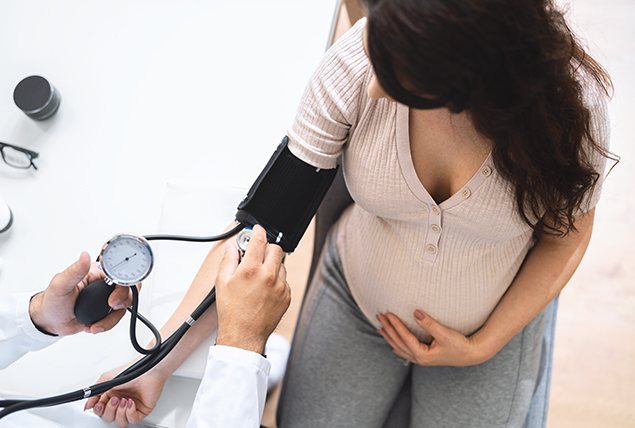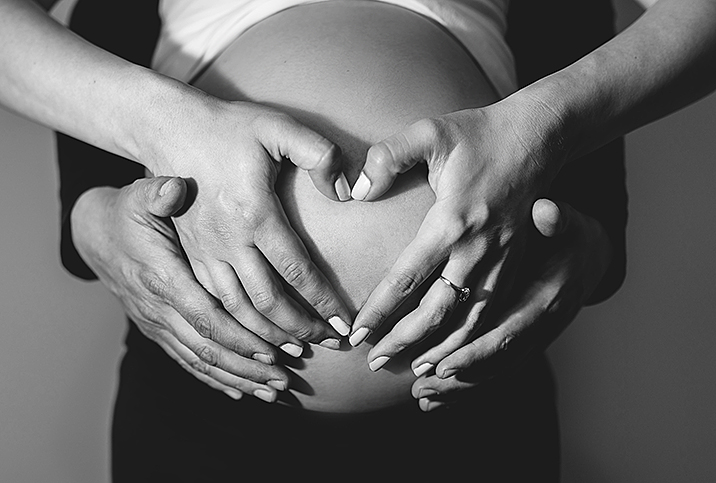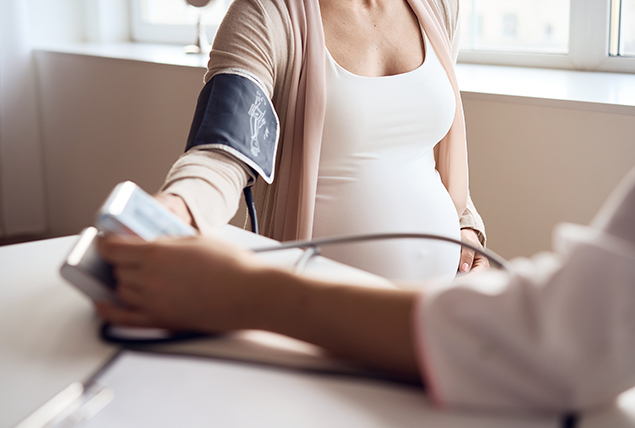Can High-Blood Pressure During Pregnancy Lead to Cognitive Decline?

High blood pressure (HBP), or hypertension, a condition where the force of the blood pushing against artery walls is too high, is common among pregnant people.
High blood pressure during pregnancy is a temporary health condition that may also contribute to cognitive problems later in life.
Does high blood pressure cause cognitive problems?
According to Centers for Disease Control and Prevention (CDC) estimates, hypertension affects 1 in every 12 to 17 pregnancies among people ages 20 to 44. When high blood pressure during pregnancy occurs along with high levels of protein in the urine, it's called preeclampsia.
"The formal cause of preeclampsia is unknown," said Monte Swarup, M.D., an OB-GYN in Arizona and the founder of Vaginal Health Hub. "It is thought to be due to the placenta having problems with blood vessel development."
Preeclampsia is associated with life-threatening complications for the baby, including preterm delivery, low birth weight and stillbirth. Preeclampsia also carries risks for the mother, including heart attacks, stroke, high blood pressure and kidney disease later in life, Swarup said.
Now, new research published in Neurology suggested mothers who experience preeclampsia are also at greater risk of later cognitive problems.
"Previous studies have primarily focused on cognition within 10 years after a pregnancy with preeclampsia," said study author Michelle M. Mielke, Ph.D., a member of the American Academy of Neurology. "Our results suggest that even in later life, a history of preeclampsia or eclampsia can still pose risk for greater cognitive decline."
How does the research link HBP with thinking problems?
The study involved 2,239 women ages 50 and older living in Olmsted County, Minnesota. By consulting medical records and providing questionnaires, the research team determined that 1,854 participants had normal blood pressure during pregnancy and 147 had preeclampsia or eclampsia.
What's the difference between preeclampsia and eclampsia?
"Preeclampsia includes the development of high blood pressure after 20 weeks of pregnancy along with significant swelling and protein in the urine," Mielke explained. "Eclampsia includes preeclampsia plus the development of convulsive seizures or coma. Eclampsia is uncommon, and there were only three women with a previous diagnosis in our cohort."
The researchers also found that 100 participants had gestational hypertension, formerly known as pregnancy-induced hypertension (PIH), or high blood pressure during pregnancy with no excess protein in the urine.
For the study, researchers gave participants a series of cognitive tests every 15 months for an average of five years. The cognitive tests assessed thinking and memory skills such as global cognition, executive function and visual perception.
The researchers found that the average total score of all cognition tests for participants with high blood pressure declined more when compared to those who did not have high blood pressure during pregnancy. Among women with any HBP condition, the drop was higher in those with preeclampsia and eclampsia than among those who had hypertension without those two conditions.
"Women with any hypertensive pregnancy had greater declines in global cognition, language and attention z-scores compared to women with all normotensive pregnancies," Mielke explained. "When stratified by hypertensive pregnancy type, only women with preeclampsia and eclampsia had greater declines in scores."
Why are women with HBP during pregnancy at higher risk?
There may be a few elements at play behind the increased risk of cognitive decline following preeclampsia and eclampsia, according to Mielke.
"Preeclampsia and eclampsia are systemic diseases with pronounced endothelial dysfunction and systemic inflammation, which affect cerebral circulation and may result in long-term vascular damage," Mielke explained. "[Also], preeclampsia and eclampsia are risk factors for cardiovascular disease, which can affect the brain."
Preeclampsia and eclampsia have also been linked to posterior reversible encephalopathy syndrome (PRES), Mielke said. PRES is a rare condition that manifests as neurologic symptoms such as headache, vision problems and seizures.
According to Mielke, further research is needed to understand the long-term consequences of preeclampsia and eclampsia—particularly among ethnic minorities.
"Women in the present study were predominantly white," she explained. "Hypertensive disorders of pregnancy are more common among Black women and other underrepresented minorities."
Based on current findings, Mielke said it's critical for women with preeclampsia or eclampsia during pregnancy to be aware of their elevated risk for cognitive decline in later life.
"In addition, cognitive testing beginning after menopause should be integrated, especially in the context of personal concerns regarding cognitive performance," Mielke said.
Can preeclampsia be prevented?
For new and aspiring pregnant people who are seeking to avoid preeclampsia, Swarup noted that there is "strong clinical evidence" low-dose aspirin can help prevent the condition in high-risk patients.
"Speak with your OB-GYN and primary care provider when nonpregnant to develop a plan to manage your specific condition so you can be as healthy as possible," Swarup advised.
The bottom line
High blood pressure during pregnancy is common. Your doctor will check your blood pressure at every wellness visit. If you do have a high blood pressure reading, your doctor will help. It's typically simple to treat high blood pressure during pregnancy with diet, lifestyle changes—increased physical activity and stopping smoking among them—and sometimes medication.
Do you suffer from chronic hypertension and need a new doctor? Giddy Telehealth provides a convenient online portal. Browse hundreds of healthcare professionals who span the full spectrum of specialties. Many offer same-day appointments.


















